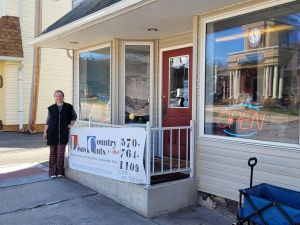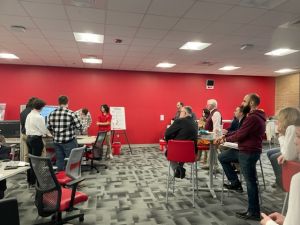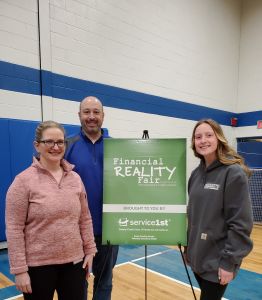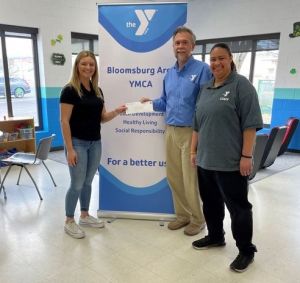Member News – April 12, 2023
Geisinger Officials Named to 2023 Health Care Power 100
Geisinger's President and CEO, Dr. Jaewon Ryu, and Dr. Julie Byerley, President and Dean of Geisinger Commonwealth School of Medicine, have been named to City & State's 2023 Health Care Power 100. Dr. Ryu was recognized for his leadership in earning Comprehensive Heart Attack Center certification for three Geisinger hospitals, while Dr. Byerley was applauded for her work in expanding educational programs to meet the rising demand for care in our communities. Congratulations to both Dr. Ryu and Dr. Byerley!
North Shore Railroad Founder Inducted

Congratulations to Dick Robey, founder of North Shore Railroad for being inducted into The American Short Line and Regional Railroad Associations Hall of Fame
EITC- Free Seminar
Educational Improvement Tax Credit Program Thursday April 27, 9:00 - 10:00 am. Join Zoom Meeting https://lnkd.in/ef4VribM Meeting ID: 890 6545 7004 Passcode: 806240
Community Health Needs Assessment
To gain a better understanding of health needs across the region, Geisinger, Allied Services, and Evangelical Community Hospital are again collaborating to conduct a Community Health Needs Assessment (CHNA) of northeastern and central PA counties. Complete the survey by April 24th, here.
Community Giving Foundation Nonprofit Leadership Series
The Nonprofit Leadership Series provides free professional development opportunities to area nonprofit leaders. The session will be offered on Wednesday, April 26th at the Montour County Admin Center in Danville. The deadline to register for the workshop is April 19th. Learn more at csgiving.org/nonprofit-leadership-series.
Keystone Pest Celebrating 22 Years in Business
Congratulations to Keystone Pest Management! They will be celebrating 22 years in business on April 15th!
Town of Bloomsburg:
- Seeks Artists for Town Hall Murals
- The Town of Bloomsburg seeks artists interested in submitting sketches for potential murals on the low walls outside Town Hall facing East 2nd Street/College Hill. The Town does not at this time have any funds identified to pay the artist(s); however, they are open to seeking grant funds and/or covering the cost of the paint/materials. Once the sketches come in, the Planning Commission will forward their recommendations to Town Council to discuss the details of completing the project. The Planning Commission will meet on April 20th to discuss the submitted sketches. You may submit your ideas to Lisa Dooley, Town Manager, at ldooley@bloomsburgpa.org and to Kyle Bauman, Code Enforcement Officer, at kbauman@bloomsburgpa.org.
- An Independence Day Celebration has been announced for July 4th at Town Park. For more information visit bloomsburgpa.org.
Bloomsburg Children's Museum April Events
The Children's Museum has a full calendar of events in April, including this partnership with the YMCA for Healthy Kids Day:
Bloomsburg Mini Maker Faire
Saturday, April 22nd
10-4:00 p.m.
The Bloomsburg Mini Maker Faire® is a FREE Bloomsburg Children's Museum organized event hosted on Saturday, April 22nd. This one-day, family-friendly event celebrates arts, crafts, engineering, food, music, science and technology projects, and the Do-It-Yourself (DIY) mindset. It's for resourceful, creative people who like to tinker and love to make things. Craftsmen, artisans, performers, homesteaders, crafters, inventors, thinkers, and doers are welcome to apply to be Makers. The Faire will showcase cutting-edge technology such as 3D printing and robotics but also have more traditional trades such as woodworking, fine arts, and sewing crafts.
LPN Open House April 20
Join the CSIU at the 2023 Central Susquehanna LPN Career Center (CSLPNCC) Open House. Tour the new, state-of-the-art facility, meet the faculty, and see why the CSLPNCC is the premier school in the region for licensed practical nursing education. Staff will be available to answer questions about financial aid and walk you through the application process. See the flyer.
Bloomsburg YMCA Community Events
On April 22, join the Bloomsburg YMCA and the Bloomsburg Children's Museum Mini Maker Faire for the annual Healthy Kids Day. Check out the flyer.
McKonly & Asbury Webinar and Seminar:
- SOC versus SOX
- Join Elaine Nissley and Lynnanne Bocchio to better understand the differences between Service Organization Controls Reports (SOC) and Sarbanes-Oxley Act of 2002 SEC requirements. Webinar is April 27th at 2:00 pm. Register to attend.
- Business Transition Planning - What is Your Plan?
- Join McKonly & Asbury for this free seminar at Bloomsburg University's Monty's Hall, 400 East Second Street, Bloomsburg. Time: 8:00 AM to 9:30 AM, May 2, 2023. The presentation will discuss the impacts of transitioning a business. Register to attend.
2023 Covered Bridge Photo Contest Returns! - Experience Columbia -Montour Counties
Each year, the Visitors Bureau holds a photo contest to produce a 550-piece puzzle featuring one of the area covered bridges. The 2023 Covered Bridge Photo Contest runs from Saturday, April 1st through Wednesday, May 31st at midnight EST. We’re excited to see another fantastic set of entries from everyone! Click HERE to learn how to enter!
Member News – April 5, 2023
Town of Bloomsburg Seeks Artists for Town Hall Murals
Lisa's Country Cuts & Spa Has Moved
Lisa's has relocated to 328 Main Street in Catawissa. Drop by to see them at their new location!
Artspace Gallery to Feature New Show
Check out the new show, called "Rare Earth", which debuts with an artist reception on April 8 from 4 pm to 6 pm.
Downtown Bloomsburg, Inc. - 1st Friday's
First Fridays is a collaboration between DBI and downtown businesses. From 5 pm to 8 pm on the first Friday of each month, participating businesses will feature specials and there will be live music, children's activities, pop-up vendors & more! What's on tap for Friday, April 7?
Community Giving Foundation:Berwick Announces Dale Baker Fund

The Dale Baker Endowment Fund was created in memory of Dale Baker, a young man who passed away in the Nescopeck fire last August. Community members and local firefighters came together to create this fund as a lasting legacy for Dale. The fund will provide financial assistance to Berwick Area Little League Association players—an organization and sport that Dale was passionate about. Read the release.
Bloomsburg Children's Museum April Events
The Children's Museum has a full calendar of events in April. Check out some of the events below which are free to the community!
All Abilities Night
Friday, April 7th
3-7:00 p.m.
Come to a fun night out for All Abilities Night! Enjoy a reduced number of visitors, space, and freedom to explore at your own pace. We offer adapted exhibits, a quiet area, and an opportunity to network with other families. All Abilities Night is a FREE event held regularly.
Bloomsburg Mini Maker Faire
Saturday, April 22nd
10-4:00 p.m.
The Bloomsburg Mini Maker Faire® is a FREE Bloomsburg Children's Museum organized event hosted on Saturday, April 22nd. This is a one-day, family-friendly event that celebrates arts, crafts, engineering, food, music, science and technology projects, and the Do-It-Yourself (DIY) mindset. It's for resourceful, creative people who like to tinker and love to make things. Craftsmen, artisans, performers, homesteaders, crafters, inventors, thinkers, and doers are welcome to apply to be Makers. The Faire will showcase cutting-edge technology such as 3D printing and robotics but also have more traditional trades such as woodworking, fine arts, and sewing crafts.
LPN Open House Set for April 20
Join the CSIU at the 2023 Central Susquehanna LPN Career Center (CSLPNCC) Open House. Tour the new, state-of-the-art facility, meet the faculty, and see why the CSLPNCC is the premier school in the region for licensed practical nursing education. Staff will be available to answer questions about financial aid and walk you through the application process. See the flyer.
Bloomsburg YMCA Community Events
On April 22, join the Bloomsburg YMCA and the Bloomsburg Children's Museum Mini Maker Faire for the annual Healthy Kids Day. Check out the flyer.
Innovative Manufacturer's Center (IMC) Events
IMC will host two free events in April. Contact Lauri Moon, IMC Outreach & Special Projects Manager, with questions.
- April 6, 9:00 AM - 10:00 AM - webinar called "Developing Your Workforce with Online Training & Certification"
- April 11, 8:00 AM - 12:00 PM - "Electrical Safety Training for General Industry", to be held in person at Northway Industries in Middleburg, PA.
Bring Clarity to Chaos: How to Have the End-of-Life Conversation
Join Steinbacher, Goodall & Yurchak as they discuss the importance of communicating final wishes to loved ones. Event to take place at Elder Care & Special Needs Resource Center, Williamsport. Register here.

Bloomsburg University's Community Play for Children is April 8
Join the College of Education at the University Rec Center from 10 am to 3 pm for a screen-free day of hands-on games and activities that promote play. Open to children PK - 4 & parents/caregivers required to attend.
McKonly & Asbury Seminar: Business Transition Planning - What is Your Plan?
Join McKonly & Asbury for this free seminar at Bloomsburg University's Monty's Hall, 400 East Second Street, Bloomsburg. Time: 8:00 AM to 9:30 AM, May 2, 2023. The presentation will discuss the impacts of transitioning a business. Register to attend.
Zartman Construction Celebrating 50 Years of Construction Excellence
Zartman Construction invites you to join in celebrating their 50-year milestone with an Open House on May 3rd from 4:30 p.m. to 8 p.m. Please tour our facility and meet with our staff while enjoying hors d’oeuvres and refreshments. Learn more about the history of Zartman Construction here.
2023 Covered Bridge Photo Contest Returns! - Experience Columbia -Montour Counties
Each year, the Visitors Bureau holds a photo contest to produce a 550-piece puzzle featuring one of the area covered bridges. The 2023 Covered Bridge Photo Contest runs from Saturday, April 1st through Wednesday, May 31st at midnight EST. We’re excited to see another fantastic set of entries from everyone! Click HERE to learn how to enter!
First Keystone Community Bank Offers Security Tips
Here's what the American Bankers Association says to do in the event of a data breach.
SEKISUI KYDEX Judges Local Scouting STEM Contest
SEKISUI KYDEX's Sean Stabler, VP of Innovation, and Sierra Clever, R&D Specialist, were invited to judge at the 8th Annual Rube Goldberg Challenge presented by BSA Columbia-Montour Council. Future STEM leaders from our local community had the opportunity to show of their witty and creative engineering skills at this invention competition. "These events are important to our community for fostering excitement and laughter among young inventors who share a curious and imaginative mindset". - Sean Stabler
PPL Offers Ways to Save Energy
Looking to increase your home’s comfort while saving a few dollars? Here are a couple of ideas to get you started.
15 Essential Things You Should Know About Your New House
As you familiarize yourself with the ins and outs of a new space, it helps to start with the basics. Because, let’s be honest: The best time to find your water shut-off valve is before your first leak – not after. Here's 15 tips from Zimmer Insurance.
Encina and Shaw Industries Announce Carpet Waste Recycling Partnership
The agreement calls for Shaw to supply Encina with more than 2 million pounds of carpet manufacturing waste per year, reinforcing Shaw’s ongoing commitment to sustainability which includes its Cradle to Cradle Certified® commitment to product circularity. Read full details.
Sherwood Lumber recently purchased property along Industrial Court owned by DRIVE
The company plans to establish a “game-changing” distribution center for lumber and building materials. Full release can be found HERE.
SECOND WEEK OF BUDGET HEARINGS ADDRESS EDUCATION, POLICE FUNDING, LABOR MARKET AND MORE
Source: PA Chamber of Business & Industry
 The second week of budget hearings focused on a number of key issues of importance to the business community.
The second week of budget hearings focused on a number of key issues of importance to the business community.
Numerous questions were posed during the Senate Appropriations Committee hearing with the Department of Labor and Industry related to potential job loss if Pennsylvania enters the Regional Greenhouse Gas Initiative, along with the impact on jobs if a $15 minimum wage increase were implemented. Senators on the committee also expressed concerns about unemployment compensation claims processing and customer service; questioned department officials about improving the services offered to unemployment compensation claimants in CareerLink centers; and examined the extent of, and efforts to address UC fraud. Lawmakers also explored apprenticeship programs, and several noted that improving apprenticeship retention rates and streamlining apprenticeship program approval could help support job growth in the Commonwealth.
In a Department of State hearing with Senate Appropriations Committee members, officials said they identified “north of 900” categories of renewals that will be subject to a money-back guarantee called for under the Executive Order Gov. Josh Shapiro implemented in January. That order gives DOS 90 days to develop a plan that will lay out how long license applications should take with a promise that if the state misses the deadline, the applicant will receive their money back. According to a report in Capitolwire, Sen. Pat Stefano, R-Fayette, noted that the department uses license fees to cover its operating costs and asked how DOS would make up for revenue lost through refunds over missed deadlines for license approvals. Acting Secretary of State Al Schmidt told lawmakers that the intent of the pledge is to ensure that the state is refunding applicants as rarely as possible, and “no one would look favorably at” having to issue many refunds.
Gov. Shapiro’s plan to create a special fund for state police spending was a topic of the House Appropriations Hearing with the Pennsylvania State Police. The $1.6 billion proposed fund would be generated by state liquor tax revenue, among other sources, reducing the need to divert funding from the Motor Vehicle License Fund revenue that currently goes to the agency. State Police Commissioner Christopher Paris told committee members that designated funding is a long-term goal of the PSP and that transitioning away from a system in which they compete for funding with infrastructure projects would be “huge for us.” House Appropriations Committee Chairman Seth Grove, R-York, on the other hand, expressed concerns with the proposed revenue shift, saying that it would remove the PSP from the oversight of budget hearings and tie funding to the ebb and flow of revenue from a number of other sources.
Lawmakers and PA Department of Education officials agreed on many topics during a Senate Appropriations Committee hearing, particularly in terms of the governor’s funding proposals for critical school safety and mental health programs. The administration was also urged to continue its support for career and technical education funding and building career pathways to help young people find gainful employment. Ongoing questions and negotiations remain regarding the amount of proposed funding for K-12 public education and the funding formula for distributing those dollars. Gov. Shapiro has proposed a $567 million increase in K-12 spending, 8 percent more than the current year. One point of disagreement between Republicans and the administration was when the committee’s Republicans expressed their disagreement with the governor’s lack of support for Lifeline Scholarships and other school choice programs in his proposed budget.
###
Founded in 1916, the Pennsylvania Chamber of Business and Industry is the state's largest broad-based business association, with its membership comprising businesses of all sizes and across all industry sectors. The PA Chamber is The Statewide Voice of BusinessTM.
The Rise in Quiet Quitting and What to Do About It
by on
A new trend has emerged in the business world—quiet quitting. But is it really new? What’s causing quiet quitting? And how can we combat this worrying development?
 What Is Quiet Quitting?
What Is Quiet Quitting?
“Quiet quitting” is the term given to a set of employee behaviors such as not speaking up and not going above and beyond their job description. Companies want driven employees who are intrinsically motivated to take the extra step or go the extra mile. Unfortunately, the rise of worker boundaries and the search for work-life balance means many employees are exhibiting quiet quitting behaviors.
Is Quiet Quitting Bad?
Quiet quitting at work is happening, but it’s a problem that’s blown out of proportion. Some people just aren’t ambitious. Some people, justifiably, don’t feel they should do extra without being paid extra. But very few people who would be labeled “quiet quitters” are actually looking to quit. (The people you need to be worried about quitting are the actively disengaged employees who are showing clear signs and maybe even outright saying they are looking for new employment.)
And that’s what it boils down to. The name “quiet quitting” is disconnected from the actual problem—a lack of employee engagement.
One or two data points aren’t conclusive, but three points now show a worrying trend—employee engagement is going way down. According to Gallup, in 2020, 36% of employees were engaged, and 14% were actively disengaged. In 2021, 34% of employees were engaged, and 16% were actively disengaged. Now, in 2022, 32% are engaged, and 18% are actively disengaged.
What does disengagement look like?
It looks like an employee who doesn’t speak up in meetings because they feel management doesn’t care or the organization never takes a chance on something creative. It looks like an employee who isn’t empowered to take chances or even go above and beyond, so therefore they do the minimum amount of work. It looks like an employee who doesn’t feel psychologically safe in their company’s work environment and culture.
It looks like quiet quitting.
The Problems Behind Quiet Quitting
What is causing disengagement that is leading to these behaviors we might label “quiet quitting”? There are two main reasons.
Managers Need to Engage Workers
Recent Dale Carnegie research tells us that managers play a huge role in employee engagement. They are key in creating psychologically safe spaces through empathy, key in translating the organizational purpose, and key to increasing engagement by paying attention to emotional and organizational drivers.
Yet, our research shows only 38% of employees have confidence in their immediate supervisor, and only 26% value their relationship with their manager. Managers can be doing more to connect with and engage employees.
For example, prior Dale Carnegie research shows that the drivers of worker engagement include feeling valued, confident, and empowered. Managers can:
- Show more appreciation for employee efforts, not just successes.
- Provide on-the-job training to get employees confident in their work skills.
- Empower employees to make more decisions and take some risks.
Another driving factor of employee engagement is organizational purpose. Companies with a clear purpose or mission can translate that to employees through managers. But our research shows only 33% of employees believe in their company’s mission. Managers would be responsible for connecting tasks to the company’s purpose and showing employees how they are truly contributing to it.
Organizations Need to Change Company Culture
But quiet quitting isn’t just a result of managers struggling to manage. We have to concede that the way a company functions and the training they give to managers is directly tied to their managers’ poor performance and, in turn, their employees’ behaviors.
Gallup says that only 35% of managers in the US are engaged. Strikingly, 51% are not engaged, while 14% are actively disengaged. If managers are to do their jobs well, then they need the tools, training, and empowerment to do it (just like employees need from their managers).
Therefore, the company itself must also change. This could mean finding a clearer organizational purpose and using it to motivate employees. It could mean senior leadership changing their management style. It could mean starting an official employee engagement program. It could mean providing training in empathy, leadership, or communication skills for managers.
Ideally, it’s all these things. Companies must create psychologically safe spaces and foster creativity by taking risks on new ideas. For employees to change and managers to change, companies must change themselves.
The Benefits of Re-Engaged Employees
There are big benefits to increasing empathy, training managers, and re-engaging employees. Of companies employing creativity and taking risks in their work, 67% report above-average revenue growth. Companies in the top quartile for employee engagement show 10% better customer loyalty, an 18% rise in productivity, and an 81% drop in absenteeism. Companies that focus on the employee experience can improve their business.
Conversely, Gallup tells us that non-engaged and actively disengaged managers and employees cost companies a combined $319 billion to $398 billion annually. This means your company could be paying big for your disengaged employees.
Final Thoughts
When employees exhibit behaviors associated with quiet quitting, they are really signaling to companies that they are disengaged. This puts it on managers, senior leadership, and the organizational culture to bring them back around and re-engage them.
###
As an owner of the Dale Carnegie Mid-Atlantic franchise, McKonly & Asbury is able to offer an extension of services to our clients and friends of the firm, expanding our expertise in the areas of leadership, team building, and people development as Dale Carnegie offers programs in leadership, management development, customer engagement, service, sales, communication, and more.
Chamber Welcomes Leighow
 The Columbia Montour Chamber of Commerce is pleased to announce the addition of Patricia “Patti” Leighow to the staff as the Chamber’s Finance Assistant. This part-time position provides support to the Chamber and its affiliated organizations, the Foundation of the Columbia Montour Chamber, and Downtown Bloomsburg, Inc, respectively. “Patti’s expertise and ability to hit the ground running are invaluable to our team,” said Chamber President Chris Berleth. “She comes to us with a plethora of business management experience and is exactly the subject matter expert we need to help us in-house. To top it off, she’s already well-connected to Chamber programming. She’s a very welcome addition.”
The Columbia Montour Chamber of Commerce is pleased to announce the addition of Patricia “Patti” Leighow to the staff as the Chamber’s Finance Assistant. This part-time position provides support to the Chamber and its affiliated organizations, the Foundation of the Columbia Montour Chamber, and Downtown Bloomsburg, Inc, respectively. “Patti’s expertise and ability to hit the ground running are invaluable to our team,” said Chamber President Chris Berleth. “She comes to us with a plethora of business management experience and is exactly the subject matter expert we need to help us in-house. To top it off, she’s already well-connected to Chamber programming. She’s a very welcome addition.”
Patti is the owner of Freas Farm Winery and past Executive Director of the SusQ Cyber Charter School. She holds a Master’s Degree in Educational Leadership and Administration from PennWest California, a Master’s of Business Administration from Rutger’s University, and a Bachelor of Science degree in Finance from Bloomsburg University. She currently serves on the Board of Directors for the Community Giving Foundation: Bloomsburg and is an active member of the Community Giving Foundation’s Women’s Giving Circle, through which she has served as a facilitator for the Chamber’s Leadercast: Women program.
Chamber Welcomes Director of Member Engagement

The Columbia Montour Chamber is pleased to welcome Taryn Crayton to the staff to fill the role of Director of Member Engagement. In this role, Taryn will provide leadership in delivering a high return on investment to members by serving as the driving force in forging member connections and executing and enhancing the organization’s events, communications, and programs. In addition to her work with the Chamber, Taryn will also spend a portion of her time coordinating programs, events, and communications for the Chamber’s Foundation, including but not limited to Leadership Central Penn, the organization’s 31-year-old community leadership program.
Taryn is no stranger to community organizations, having begun her professional career at the Lehigh Valley Economic Development Corporation. She holds a B.A. in Communications from Eastern University and is a 2022 graduate of Leadership Central Penn, and has also worked for several small businesses. Most recently, Taryn worked for five years as an Advertising and Printing Sales representative with the Press Enterprise. She is also involved in the community and serves with the Bloomsburg Rotary and on the Board of Directors for Bloomsburg Children’s Museum. In 2022, she served as a Chamber Ambassador.
“We’re so excited to have Taryn on our team,” said Chamber President Chris Berleth. “She comes to us with a wealth of community knowledge, she’s widely regarded for her professionalism and leadership, and her love for our region will be a huge asset as we work to meet the Chamber’s mission. She’s going to be a wonderful resource for our members and community stakeholders.”
Taryn is a dance teacher with Danceworks by Amber in Bloomsburg, and translated her passion for dance into studio ownership, as she is the owner/director of Remade by Dance in Barnesville. Taryn and her husband Derek live in Berwick with their dog Millie.
Please join us in welcoming Taryn to the Chamber. She can be reached at tcrayton@columbiamontourchamber.com.
5th Annual Regional STEM Competition

On Thursday, March 23rd, the 5th Annual Regional STEM Competition was held at Bloomsburg Area High School. Schools from across the region participated including Berwick Area, Central Columbia, Columbia Montour Vo-Tech, Midd-West, Montgomery Area, Shamokin Area, Warrior Run Area.
Tasked to solve a regional problem utilizing a Raspberry Pi (micro PC), the students were required to present both a written and live presentation of their project. Judging was conducted by regional experts including Dr. Victor Vogel, Tanya Dynda, Al Neuner, Adam Joline, and Brandon Brown. The student presentations were excellent! It was a powerful night of innovation, collaboration, and school pride.

Competing teams vied for several scholarships. At the end of the evening, Berwick Area High School won first place ($5,000), second place went to Warrior Run High School ($2,500), and Shamokin Area High School won third ($1,000).
A special thank you to Greg Martz of VZRscada.com, Dr. Kimberly Bolig of Commonwealth University, Eric Pangelinan of the Community Giving Foundation, Alexa Hann of Advance Central PA, and Jeff Emmanuel of the Foundation of Columbia/Montour Chambers. Thanks also to Bloomsburg Area High School for hosting. The event was sponsored by Commonwealth University, the Foundation of Columbia Montour Chamber of Commerce, Community Giving Foundation, Advance Central PA, and VZRscada.com.
PA Chamber & PA State Building & Construction Trades Council Join Forces in Calling for Permitting Reform
Source: PA Chamber of Business & Industry
 In case you missed it… The heads of Pennsylvania’s leading business organization and building trades union penned a joint op-ed published by the Reading Eagle calling on state lawmakers to enact permitting reforms that will benefit businesses, employees, and communities.
In case you missed it… The heads of Pennsylvania’s leading business organization and building trades union penned a joint op-ed published by the Reading Eagle calling on state lawmakers to enact permitting reforms that will benefit businesses, employees, and communities.
“Business and labor agreeing? This has been a rare sight over the years,” Pennsylvania Chamber of Business and Industry President and CEO Luke Bernstein and Pennsylvania State Building & Construction Trades Council President Rob Bair wrote. “Today, it is a realization that by working together, we can create greater opportunities for every Pennsylvanian and make our state stronger.”
Permitting reform – or improving the process by which construction and other development projects obtain approvals from government agencies – has been gaining bipartisan support this year as lawmakers from Democratic Gov. Josh Shapiro to the Republican-led Senate have agreed that the current process is broken.
Bernstein and Bair outline several bipartisan steps lawmakers should take to streamline the state’s permitting process, including having permits be “deemed approved” if an agency fails to meet a required deadline; allowing for qualified third-party reviewers of permit applications; providing certainty to state agencies that their decisions will stand up in court; limiting attorney’s fees to combat frivolous lawsuits; and adding transparency to the process by allowing applicants to see the exact status of their applications.
You can read the full op-ed on the Pennsylvania Chamber website.
The op-ed is the latest of several steps the Pennsylvania Chamber has recently taken to promote permitting reform.
- In February, Bernstein published an op-ed explaining how permitting reform will make Pennsylvania competitive on the national and world stage.
- Last week, Pennsylvania Chamber Director of Government Affairs Kevin Sunday testified at a House Republican Policy Committee hearing, highlighting investments Pennsylvania lost in recent years due to a dysfunctional state permitting process. The Chamber’s testimony identified a comprehensive solution to the permitting process that addresses state agency resources, permit deadlines, and reforms to the permit appeals process.
- On Monday, the Pennsylvania Chamber joined the national “Permit America to Build” coalition and sent a letter to Congress urging federal lawmakers to enact legislation that will modernize permitting processes.
Member News – March 29, 2023

Service 1st team members volunteered for the Financial Reality Fair recently held at Warrior Run High School. Photo (l-r): Jennifer Watts, Assistant Vice President Milton Market, Service 1st; Mike Thomas, Chief Financial Officer, Service 1st; and Mackenzie Watts, Senior, Warrior Run High School.
Service 1st and Warrior Run High School Host Financial Reality Fair
Service 1st Federal Credit Union recently partnered with Warrior Run High School to host a Financial Reality Fair. Over 220 juniors and seniors took part in the mock budget experience.
The Financial Reality Fair is designed to place students in real-life situations where they select a career, are provided with an entry level salary and challenged to make decisions while remaining within budget. Students are required to visit booths at the Fair and purchase necessities, such as housing, clothing, food and transportation. As in real life, non-essential options are also presented, such as entertainment, internet and cell phones. Before leaving the Fair, students must spin the “reality wheel” and meet with financial counselors from Service 1st to review their decisions.
For more information or to schedule a Financial Reality Fair, visit www.service1.org or call 800.562.6049.
Hand in Hand Family Resource Center Offering Free Screening of "The R Word"
Join Hand in Hand FRC on March 30 from 6:30 pm to 8:00 pm as they screen "The R Word", a film that investigates the long-reaching history and lasting implications of the word "retard(ed)" and the attitudes and perceptions about people with intellectual and developmental disabilities. The screening will take place at the Kuster Auditorium, Hartline Science Center at Bloomsburg University.
Bloomsburg Area YMCA Receives $7,000 from Clark Foundation

Congratulations to the Bloomsburg Area YMCA, which recently received generous support from the Clark Associates Charitable Foundation, the charitable arm of Clark Associates/Webstaurant Store. The funds were used to purchase a commercial refrigerator and freezer to support the food service program at the YMCA. The Bloomsburg YMCA serves free breakfast and snacks to the daycare program and this summer will also be providing free lunch to the summer day camp and kiddie camp programs.
Central Susquehanna What's So Cool About Manufacturing? Contest Needs Your Votes
The contest, produced by the Innovative Manufacturers' Center, The Central Susquehanna Intermediate Unit and The Foundation of the Columbia Montour Chamber features schools from across the region, including, from Columbia and Montour Counties: Bloomsburg Area Middle School, Central Columbia Middle School, Berwick Area Middle School, Southern Columbia Middle School, Millville Area Junior-Senior High School, and Danville Middle School. Teams from each school explore manufacturing careers and produce video profiles of companies in the region. Judges bestow a variety of awards, but they need your vote for the Viewers Choice Award. Vote here.
Helping Your Home Recover from Winter
Winter is rough on homes. Did yours withstand the season well? Check out this blog post from Zimmer Insurance Agency.
Turkey Hill Brewing Company Welcomes Live Music
Jung Bergo returns to Turkey Hill Brewing Co. on March 30.
SEDA-COG Welcomes Two New Employees
Tanya Collins and Tonia Troup were recently hired at SEDA-COG to serve as Project Coordinators in the Community Development Department. Congratulations!
Town of Bloomsburg Seeks Artists for Town Hall Murals
Bloomsburg YMCA Community Events
Join the YMCA for their Annual Easter Egg Hunt on April 1 from 1 pm to 3 pm in their green space. Rain date: April 2, 11 am to 1 pm. Check out the flyer.
On April 22, join the Bloomsburg YMCA and the Bloomsburg Children's Museum Mini Maker Faire for the annual Healthy Kids Day. Check out the flyer.
Glen Brook Rehabilitation and Healthcare Center Easter Egg Hunt
You're invited to the 2nd Annual Community Easter Egg Hunt at Glen Brook Rehabilitation and Healthcare Center on Sunday, April 2, 2023 at 12pm, at 801 E. 16th St. Berwick, PA 18604, on the Building 2 lawn. With questions, contact Maria Fazio at (570) 204-8308 or mfazio@glenbrookrhc.com. See the flyer!
Innovative Manufacturer's Center (IMC) Events
IMC will host two free events in April. Contact Lauri Moon, IMC Outreach & Special Projects Manager, with questions.
- April 6, 9:00 AM - 10:00 AM - webinar called "Developing Your Workforce with Online Training & Certification"
- April 11, 8:00 AM - 12:00 PM - "Electrical Safety Training for General Industry", to be held in person at Northway Industries in Middleburg, PA.
Bring Clarity to Chaos: How to Have the End-of-Life Conversation
Join Steinbacher, Goodall & Yurchak as they discuss the importance of communicating final wishes to loved ones. Event to take place at Elder Care & Special Needs Resource Center, Williamsport. Register here.
Bloomsburg Theatre Ensemble Announces Auditions for this Summer’s ‘Dragons Love Tacos’
BTE announced an audition date for this summer’s ‘Dragons Love Tacos.’ Auditions for children and teens ages 8 to 18 will be held on April 15th at the Alvina Krause Theatre, 226 Center Street, Bloomsburg. The doors will open at 9:30 am, and auditions begin at 10:00 am. Read the full release.
McKonly & Asbury Seminar: Business Transition Planning - What is Your Plan?
Join McKonly & Asbury for this free seminar at Bloomsburg University's Monty's Hall, 400 East Second Street, Bloomsburg. Time: 8:00 AM to 9:30 AM, May 2, 2023. The presentation will discuss the impacts of transitioning a business. Register to attend.
Zartman Construction Celebrating 50 Years of Construction Excellence
Zartman Construction invites you to join in celebrating their 50-year milestone with an Open House on May 3rd from 4:30 p.m. to 8 p.m. Please tour our facility and meet with our staff while enjoying hors d’oeuvres and refreshments. Learn more about the history of Zartman Construction here.
Changes to Depreciation Coming in 2023
Source: McKonly & Asbury
 We’re all currently knee-deep in 2022 year-end taxes right now, but there are two changes to keep in mind as you’re doing 2023 quarterly estimates – bonus depreciation phase-out and PA’s new Section 179 rules.
We’re all currently knee-deep in 2022 year-end taxes right now, but there are two changes to keep in mind as you’re doing 2023 quarterly estimates – bonus depreciation phase-out and PA’s new Section 179 rules.
Bonus depreciation phase-out
First off, what is bonus depreciation?
Bonus depreciation is a tax deduction that allows businesses to write off the cost of certain assets in the current year, instead of capitalizing and taking the deduction over 5 years or more. Currently, you can take 100% bonus depreciation on assets that have less than a 20-year useful life, meaning you can write off the entire cost of the asset in year 1. This excludes residential and commercial property. This is obviously a very large tax saving for many taxpayers.
The Tax Cuts and Jobs Act of 2017, however, begins to phase out bonus depreciation starting in 2023 by dropping the maximum amount to 80%. The deduction then phases out over the next four years: 80% in 2023, 60% in 2024, 40% in 2025, and 20% in 2026. Unless Congress extends it, bonus depreciation will no longer be available after 2026.
For taxpayers who are accustomed to taking large amounts of bonus depreciation each year to reduce their tax liability, the next couple of years could be an unpleasant surprise. It’s something taxpayers should be keeping in the back of their minds when considering cash flow over the next couple of years. Something else to consider would be accelerating purchases into years with bonus depreciation still enacted if it makes sense from a business perspective.
Pennsylvania Section 179 Depreciation
What is section 179 depreciation?
Similar to bonus depreciation, Section 179 depreciation allows a taxpayer to deduct the entire cost of the asset in the first year it’s placed in service. While there are no restrictions on the amount or income limits for taking bonus depreciation, there are some limits for Section 179 depreciation. For 2022, the maximum section 179 expense deduction is $1,080,000, with that limit being reduced when the cost of Section 179 property placed in service during the year exceeds $2.7 million. Taxpayers also must be in an income position to claim bonus depreciation in the current year, i.e. it can’t be used to create a net operating loss.
For personal income tax in Pennsylvania, prior to 2023, Section 179 depreciation was capped at $25k. However, starting in 2023, Pennsylvania will follow the federal rules ($1,160,000 when adjusted for inflation). This is huge for taxpayers with the majority of their activity in Pennsylvania and something to be considered when looking at 2023 quarterly estimates.
Please contact McKonly & Asbury if you have questions about the information outlined above.


 What Is Quiet Quitting?
What Is Quiet Quitting?